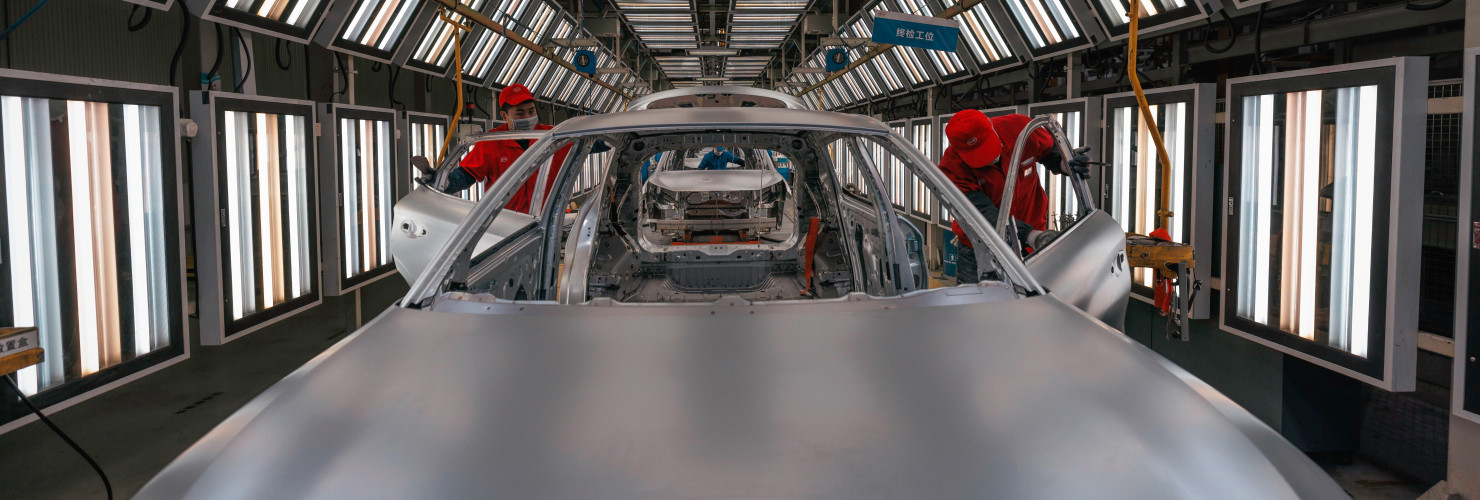

China’s “Little Giants” turn up the heat on Europe's Hidden Champions
European car manufacturers already face challenges in China today. With targeted support and reformed stock market rules, the leadership in Beijing are now also targeting the market share of small and medium-sized foreign companies.
Germany is considered the land of "Hidden Champions." Countless small and medium-sized enterprises (SMEs) have successfully developed specialized products and sold them globally, often over generations. What larger companies have been dealing with for some time is now threatening them as well: competition from China. Under Xi Jinping, the government is supporting thousands of high-tech SMEs, from machinery manufacturers to suppliers for electric vehicles. The ultimate goal: replace foreign imports with domestically produced products.
In 2018, Beijing launched a program inspired by Germany to cultivate so-called "Little Giants." It aims to help promising companies grow into leaders in their respective fields. The program received a new boost recently when Premier Li Qiang visited several such companies and called on them to develop key technologies to ensure the country's economic security. Beijing's priority today is less economic growth (and thus less trade with Europe) and more technological self-reliance.
Beijing's means to support smaller high-tech companies are abundant: a dynamic, multi-tiered evaluation system helps identify innovative firms. Provincial governments have identified 98,000 "Specialized SMEs," while national authorities have selected more than 12,000 particularly promising Little Giant firms.
Smoothing the pathway to China's stock exchanges
To be included in the Little Giants program, companies must operate in one of ten priority sectors from the “Made in China 2025” plan. These include computer numerical control (CNC) machining, electric vehicles, or medical devices. Additional evaluation criteria include a company's potential to replace imports or to secure a significant global market share in innovative niche products.
Government-backed firms benefit from increased cooperation with large companies, to help them fill supply chain gaps, as well as with universities on research and development (R&D). They are supported in intellectual property matters – and, above all, financially supported. The state acts as a patient investor to early-stage high-tech SMEs by leveraging government guidance funds and through favorable loans from state-owned banks, which serve "Little Giants" in specially created departments.
Companies can also more easily raise capital on the stock markets thanks to simplified listing requirements. In 2022, 40 percent of listings on the Shanghai, Shenzhen and Beijing stock exchanges were made by Little Giants. For example, in September, Hubei Kait Automotive raised CNY 133 million (around EUR 15 million) during its IPO in Beijing. The supplier of automotive electronics and sensors counts Chinese automaker BYD and Volkswagen among its customers.
Numerous Little Giant firms are contributing to China's rise in the e-mobility sector. Guizhou Anda produces battery materials for major battery manufacturers such as CATL, BYD, and CALB. The company was listed on the Beijing stock exchange in March 2023, raising CNY 650 million (around EUR 88 million). Welion, a provider of high-performance solid-state batteries, is rapidly expanding its production capacities and plans to go public by 2025. The company has already won Nio as a customer and has reportedly attracted interest from companies like Volkswagen and Mercedes-Benz.
About 40 percent of exports could be threatened
China's pursuit of its own Hidden Champions challenges not only German but also European companies. They could lose market share in China and globally. The EU’s exports to China are worth EUR 230 billion in total and are heavily concentrated in machinery, vehicles and other manufactured goods. About 40 percent of that could be threatened by Chinese competitors.
Foreign companies producing in China are less vulnerable to China's efforts to secure supply chains. However, domestic competition is growing, especially in sectors that China defines as strategically important, such as mechanical engineering, an area where German companies are especially active.
Given the rising challenge from China’s state-backed SMEs, Europe must act. Chinese industrial policy deftly combines state guidance and market mechanisms. By further blurring the lines between state-support and market-forces, Beijing has made it even more difficult for economic partners to assess subsidies of various forms. The EU must support its own Hidden Champions and protect the internal market. Investments are needed, such as in institutions like the EU Commission's SME Trade Helpdesk.
European companies, in turn, need to prepare themselves for growing competition and safeguard their core technologies. China's ambitious high-tech SME program ought to be a wake-up call. In many areas, the times when European companies enjoyed a clear technological advantage in China are coming to an end. Europe’s automotive sector, especially in the field of electric vehicles, has already experienced a rude awakening. Now Europe’s Hidden Champions could be next.
This comment is based on an Op-ed published in Manager Magazin: "Chinas "kleine Riesen" setzen Europas Hidden Champions unter Druck."
You can read more on this topic in the MERICS report entitled “Accelerator state: How China fosters "Little Giant" companies.”


